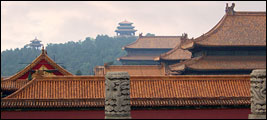 |
|
|
Are
you listening
Everyday we use listening skills more than any other communicating skills. It is the least practiced and least taught and I would go as far as saying the least understood. Whenever we should be listening, either we are preoccupied with something else and don't really hear what is being said or we start to hear what we want to hear. This in turn leads to a full array of miscommunication. It is no different in the martial art world. Listening is probably the most important and basic skill to be mastered. The information transmitted by the opponent comes to us in many ways. Some is very physical, by being in contact somewhere on his body, and some more subtle, through eye contact. The physical contact will reveal tension and lack there of, it will also reveal his center and his root, it will reveal the holes in his structure, and with serious training it will also reveal his intentions. The eye contact will deal more with body language. A few other basic skills are required before the real listening happens. Relaxation for one is an essential element along with connecting, following and sticking. The integrity of your structure and body alignments must be understood and applied. Once you stick to your opponent, relax and let the information flow in. Don't anticipate or judge what is happening. Just let it come in and listen. Through listening, you will eventually understand what is happening. You will know when it's happening, and as it develops, you will be just there waiting and ready to respond. Pre-judging is an error, it will sidetrack you because your mind is already made up. As soon as you make contact with the opponent you are listening. Actually the listening happens before that; it happens as soon as eye contact is made. At that point listening happens with the eyes. The body language is one thing, but there is also this energy the opponent sends out. He is communicating some information and in time and with experience, your body will process and evaluate this info and you will know how to respond appropriately. It may be just a minor adjustment like moving your feet, shifting your center, moving your waist, or it may be on a larger scale like realigning your whole structure or moving out of the way. With experience it all happens automatically without any thoughts. Through practice your body is trained to react to certain stimulus. Your body knows. You don't analyze it anymore, because there is just no time. Reacting to the factual content and disregarding the distorted signals is the goal! Here's an exercise that I like:
Stand in a horse stance with your feet approx. shoulder width. It goes without saying that you assume a posture that has all the taiji qualities - head suspended, shoulders down, elbows down, knees slightly bent, etc. For this exercise you can do it either with your eyes closed or opened. I prefer with the eyes closed at first. Put one hand on the partner's forearm. The contact on your partner may vary, sometimes light and sometimes a bit deeper. Don't confuse the two by alternating from light to deep in the same session; either you choose light or either you choose to contact deeper. Now, it's the time to listen. Relax……..relax even more. Give yourself to your partner. As your partner moves his arm around, for example, you stay connected, stick and follow to him/her and don't disconnect. Listen with your body - where is the arm connected - where does the movement originate from. Does it come from the shoulder, does it come from his center. Again, listen. Where is the root of his actions? What about his other arm? Do you feel it? Is it moving? What about his feet?
Let's not forget that the listener's role is to listen and receive information. Be the best listener you can be. Don't interrupt, don't judge, don't comment, don't argue mentally, just give your undivided attention. You have to be interested, and attentive. Take all the time you need, be patient. You will sort out the clutter by screening out distractions and improve on accuracy. Marc Seguin, January 2006 |
||
|
last updated on May 12, 2008 |
|
About Us | Taiji | News & Events | Articles | Resources | Contact Us |
|

